Here's one from the vaults, my 2012 interview with author Richard Lamparski:
As a kid, I discovered a '60s and '70s book series called Whatever Became Of...? by Richard Lamparski. If you've never read them, they each contain about 100 profiles of and/or interviews with celebrities of yesteryear, meaning 20 to 50 years prior to their publication. As such, they work as introductions (if you've never heard of Virginia Field or Randolph Scott), reminiscences (if you have) and also, I would argue, as a treatise on the gay man as pop cultural voyeur.
The books sprang from a radio show, and created for Lamparski a long, illustrious career as a connoisseur of has-beens — all of whom could be proud not to have been never-weres.
Lamparski's were seminal books in my life, and influential to the point that I found myself asking, “Whatever became of ... Richard Lamparski?”
After some Internet sleuthing, I found he was alive and living in Santa Barbara, where I was able to call him for a fascinating, if lengthy (you were warned!), chat the day before his eightieth birthday about his early life, his unforgettable books and his adventures as a fame tourist...

Gr8erDays: I’ve read you are a Michigander like I am — I’m from Flushing.
Richard Lamparski: There are a lot of place there that happened after I left. I’ve been gone for 60 years.
G: What was your childhood like?
RL: A nightmare. [Laughs] There were fun parts in it because you’re a kid and you laugh and there was pleasure to be had, but my home life was just …ghastly.
I told this to a nun I had — I went to parochial school — years ago, I told it to my ninth-grade nun who remembers me and remembers the emotional state I was in, and she said, “How is your life?” and I said, “I’ve had the most wonderful adult life.” I felt it was a reward. It was God saying, “You went through what you did for 19 years and now the rest can be great fun!” And it has been.
G: Do you think your bleak childhood led you to escape into the world of celebrity?
RL: Oh, sure. Yeah. It was very, very boring and I think that’s why I was drawn to what I thought was glamour in the screen and famous people, and celebrities and travel and luxury — yes.
G: Did you have particular idols as a kid?
RL: No, no, I didn’t. I was curious about all of them. The main focus of my life is curiosity. I know people expect me to have had great heroes, but the first hero I ever had was Somerset Maugham [1874-1965]. He introduced the film Quartet [1948] and it was a great hit, and then he introduced Trio [1950]. I’d never seen him. I’d heard his name on the radio, but I’d never seen him, and when I did he was on for five, seven minutes [before the films] talking about what we were about to see and I thought, “He looks to me like he has been everywhere and met everyone and done everything and had one hell of a life. I would love to look like that and sound like that and be like that.” Well, it turns out I wouldn’t. [Laughs] But he did have a very, very interesting life.
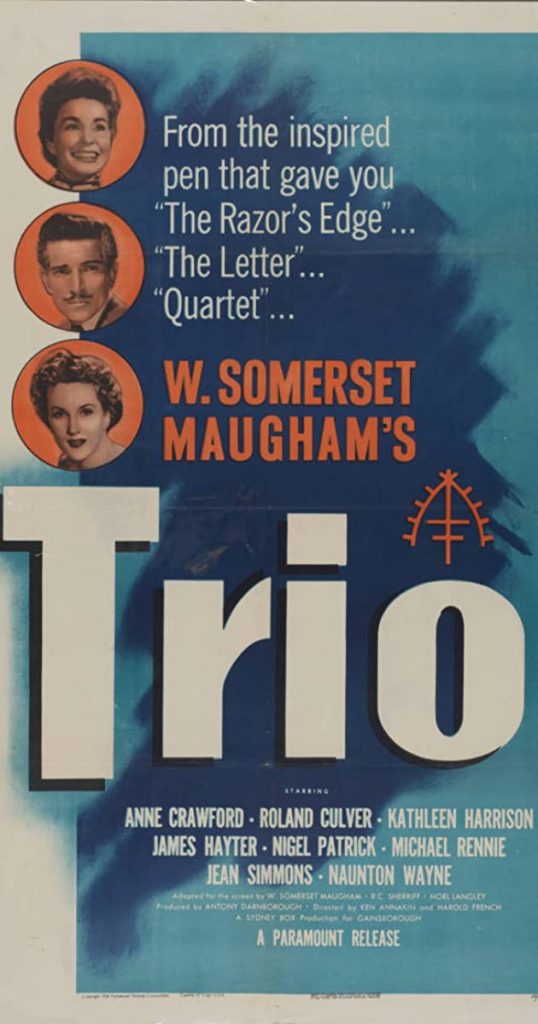
I don’t join in his cynicism about people or life at all; I don’t think he was really very happy, but he was [my first hero]. And about the same time, John Nesbitt [1910-1960] kicked in, although I didn’t know what he looked like because he was first was a radio personality [The Passing Parade, 1937-1951]. That’s always how I’ve viewed life, as a parade I got to see. I’m a voyeur, an onlooker, and that’s how he viewed life. I thought, “I would love to have a life like that.” As far as I know he did have a very interesting life.
G: Were you ever a collector as well as a fan?
RL: I accumulated. No, I didn’t. Most everything I’ve given away. When one gets on in years — and tomorrow I’ll be 80 years old, which impresses even me — you feel weighted down by things and I think, “Oh, they’ll end up in a Dumpster,” so I give them to people I think are deserving and will appreciate them. Oddly enough, a lot of the things that are very special, things that were owned by movie stars for instance, I’ve had to give to people I don’t really like, but they are fans, you know, of that particular star, so I thought, “They really deserve these, prick that he is.” [Laughs]
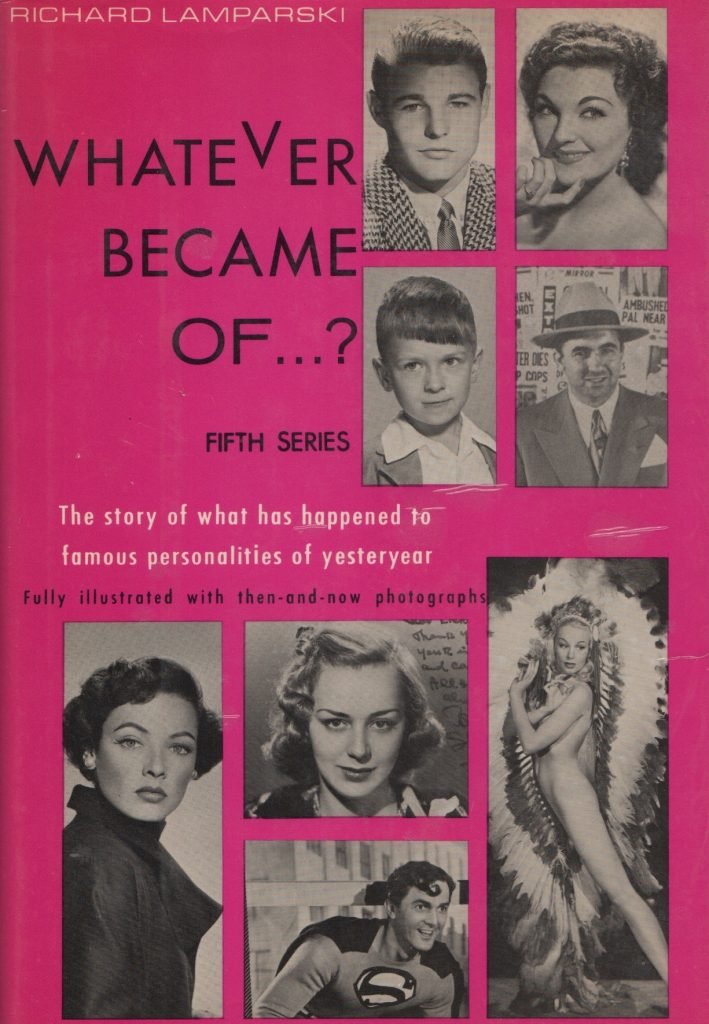
G: The title Whatever Became Of…? was similar to What Ever Happened to Baby Jane? — were you inspired by it?
RL: Well, I don’t think I was inspired by it, but I got a letter from Robert Aldrich [1918-1983] telling me that he was gonna sue me if I didn’t stop using it. I thought, “That doesn’t even deserve a response,” and he didn’t sue me.
No, I was inspired by a song from a Billy Barnes [1927-2012] review — Billy Barnes just died, I think, last week — the song was “The Rochelle Hudson Tango” [from Ben Bagley’s Shoestring ‘57]. When I heard it, I thought, “Oh, my time has come.” It’s very cute. It was sung in the review by Dody Goodman [1914-2008] and an actor who became Paul Mazursky [1930-2014]. But anyway, I can tell you the beginning: “Tell me then, whatever happened to Anna Sten [1908-1993], and what of Mona Barrie [1909-1964]? Furthermore, what became of Dorothy Comingore [1913-1971]?” I was orgasmic over it. I thought, “Yes, yes! Someone is on my wavelength.” So I think that was what really inspired me.
And then, within months, I saw a piece in one of the magazines that an organization at the University at Boulder were bringing Douglass Dumbrille [1889-1974] for a festival and I thought, “There’s no question about it anymore — the world is ready for Richard Lamparski.” So that’s how it started and it clicked instantly — right away.
G: How did you find over 1,000 people to interview pre-Internet? Was it word of mouth?
RL: It was much word of mouth, but that was another thing that encouraged me. I had a close friend (long dead) and he was very encouraging to me, but he really wasn’t very interested in what I was doing, he was only interested in movies, not movie stars. But he wanted me to succeed, and he said to me once, “I hope you’re not gonna spend a couple of years of your life trying to get this thing underway and not succeed.” And I said, “I think I will succeed.” And he said, “I can see you feel that, but for instance, how are you gonna find, I don’t know, Gale Sondergaard [1889-1985]?” I said, “Well, we know she’s alive — that’s a clue. And number two, I’ll look her up in the phone book under her husband’s name.” We knew him becaused he’d been sent to prison as part of “the unfriendly 10,” so I picked up the New York phone book and I see her — Mrs. Herbert Biberman [1900-1971]. And he looked at me and said, “You can do it. As you did that, I thought, ‘He’s going to find the name.’” And now to get the permission. I called while he was there, called cold, and told Biberman who I was. He said, “Well, she’s having a bath just now, but I’ll tell her. We both listen to WBAI, and so we’ll get back to you. Give me your telephone number and Gale will call you in the next day or so.”
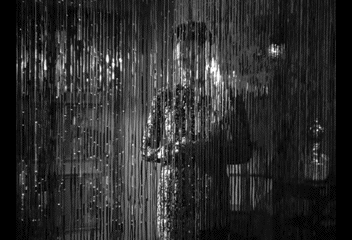
Years later, she told me that she was in the tub as he said and he came and stood in the doorway and she said, “So what was the phone call?” and he said, “It was for you,” and she said, “Who called?” and she says, “I don’t know him.” He said, “Gale, this is the time.” She said, “For what?” He said, “You can go on the air, no commercials, and tell about what happened to you. It’s WBAI. So either you’ll do it or you won’t.” She said, “I was never really sure if I had a chance to speak I would,” and she said, “He forced me into it and I realized it was the right thing to do.” So I changed her life in a way and I proved I could do it.
Once I put out the word, it was amazing — people I didn’t even think liked me, but they liked the idea, would call and say, “You know, my friend’s landlady is whoever,” and once the book came out I started doing a lot of radio and I always made it a feature of my broadcast. I’d say, “Now that I’m here in St. Louis, there are several people who may be living in this vicinity and I’d love to find them, and a free autographed book if you can tell me where so-and-so is.” And that’s how I found almost everyone. And people wrote to me also.
G: Were any the result of chance encounters?
RL: Not many, but once, this was about 30 years ago, I’d gone to interview Leon Ames [1902-1993] and I said to him — a friend of mine was driving me — and I said, “We want to have lunch,” and he said, “Gee, it’s kind of late, you know, it’s two o’clock; most of the places will be closed.” I said, “Is there any place?” and he said, “Yes, there’s a place called Rothschild’s and you’ll have a good lunch there. They’re a Jewish family from Alsace and you’ll have a very good French meal.” So we went and there was absolutely no one in the main room, but the maitre d’ came forward and he said, “We’re about to close, but we got your phone call. We can still put you in. Go in the second room.”
We went in and there was an old couple sitting way in the corner and as we walked toward them I said, “Don’t put us near any loud people because we just want a nice, quiet lunch,” and she said, “We’re going to be leaving soon, don’t worry about us disturbing your lunch,” and I said, “Fay Wray [1907-2004] can make all the noise in the world and it would be all right with me.” She laughed and she said, “You recognize me?! Without the monkey? I’m impressed.” Things like that happened.
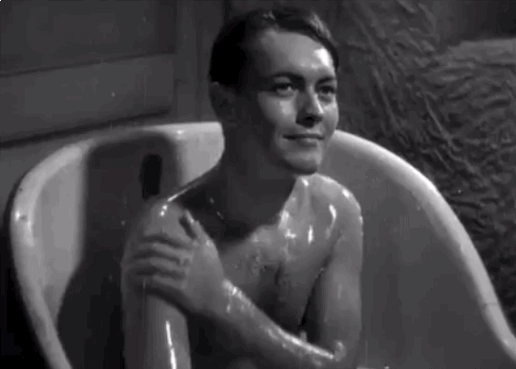
G: Do you remember the very first person you ever interviewed for any reason?
RL: Yes … Richard Cromwell [1910-1960]. I had a friend who lived next door to him, and he said to me, “I’m going to a birthday party for Richard Cromwell — do you remember him?” I said, “Well, yes!” It was his 50th birthday, 1960. I said, “Would you ask him if he would give me an interview?” He said, “Oh, well, yeah — I’ll ask him.” So he did and when I spoke with him he said, “Richard’s really not very excited about this; you know, his career is long over.” I said, “Well, did he tell you not to have me call?” and he said no. I said, “Give me the number, I’ll call.” So I did, and it took me a while to talk him into it and he said, “If you want to come by, it’s all right.” So I did.
I got home that evening and my landlady said, “How did it go?” I said, “It was the absolute worst I could ever experience — his speech was impaired, he was drugged (from medical drugs), he really didn’t like talking about his career, he was embarrassed about the fact that it no longer existed … I said, “It was wonderful because I’ll never be nervous again.” If I got through that, I could get through anybody. So it was a wonderful experience — a good experience.
G: And you weren’t asking him about being married to Angela Lansbury [b.1925] briefly, rumors of his sexuality, stuff like that?
RL: Oh, no! I wouldn’t go into that. In those days it would be unthinkable. They’d throw you down the fuckin’ steps! Often I inteviewed people who I knew were homosexual, I suppose they knew I was, but I particularly steered away from that because no one would have gone for it and anyway I don’t think a publisher would have let me do that.
G: Did you always interview stars in person, or was it sometimes on the phone?
RL: Sometimes they wouldn’t do it in person.
G: Because they were embarrassed about their appearance?
RL: Exactly, yeah. I understood that and respected it. But most of it was in person. Sometimes they came to WBAI when I lived in New York. But I found that once I took that program off the air, everything changed and it was much easier because they’d been playing to a tape recorder. Once I stopped using the tape recorder, I got a much better interview. But I’d never thought it through before. To them, they were on the radio, which of course they were, but they give you very different answers when they’re more comfortable because they’re not looking at the little machine ticking away on the coffee table. I never used a tape recorder after that.
G: Were you ever disappointed by someone you’d anticipated would be great fun to interview, but who wound up being rude or boring?
RL: I really never was disappointed because I learned very early not to have expectations because so many of them are totally unlike they were on the screen, and then the ones who were totally like they were on the screen — Iris Adrian [1912-1994] was just the way she was on the screen except she was dirtier, her language was dirtier, and she was much funnier — her own dialogue was much funnier, and I would have never expected that. But she was, she was screamingly funny and consistently funny.
Benny Rubin [1899-1986], who was a comedian, is probably the rudest man I’ve ever met in my life and the most insulting man I’ve ever met. But when I was 14, I was a stockboy at a very expensive ladies’ shoe salon and it was owned by and run by Jews. Well, I didn’t know any Jews — we were Catholic — and I just loved them! I thought, “Adults with a sense of humor! I’ve never met people like this before.” They were funny even when they didn’t mean to be, very foul-mouthed. I didn’t know that married men talked about fucking women other than their wives — they had the filthiest mouths. So I knew that old, you know, the stereotypical “old Jew with a dirty mouth and a nasty, rotten mind,” so he amused me. I never had any problem with him.
But I sent someone to him, oh, a few years before he died, he was doing a film on Vaudeville and they said, “Whom should we talk with?” and I said, “Well, Jack Haley [1898-1979] is still hanging in there and by all means see Benny Rubin. They called me a few months later and said, “That man you sent us to? He is the most insulting man! And extremely rude.” “Yes,” I said, “he is.” But that’s the way he was. I just took it as an act. this is his act and that’s what he does. And he knew I thought it was funny — I didn’t laugh, I pretended everything was serious with him and he did everything straight-faced. I never know when it was a send-up and when he meant it, but he disliked almost everyone on earth … almost. Jack Benny [1894-1974] was okay with him. The rest of them were just … [Laughs] “My dear friend, Jack Benny,” and from then on it was one put-down after another.
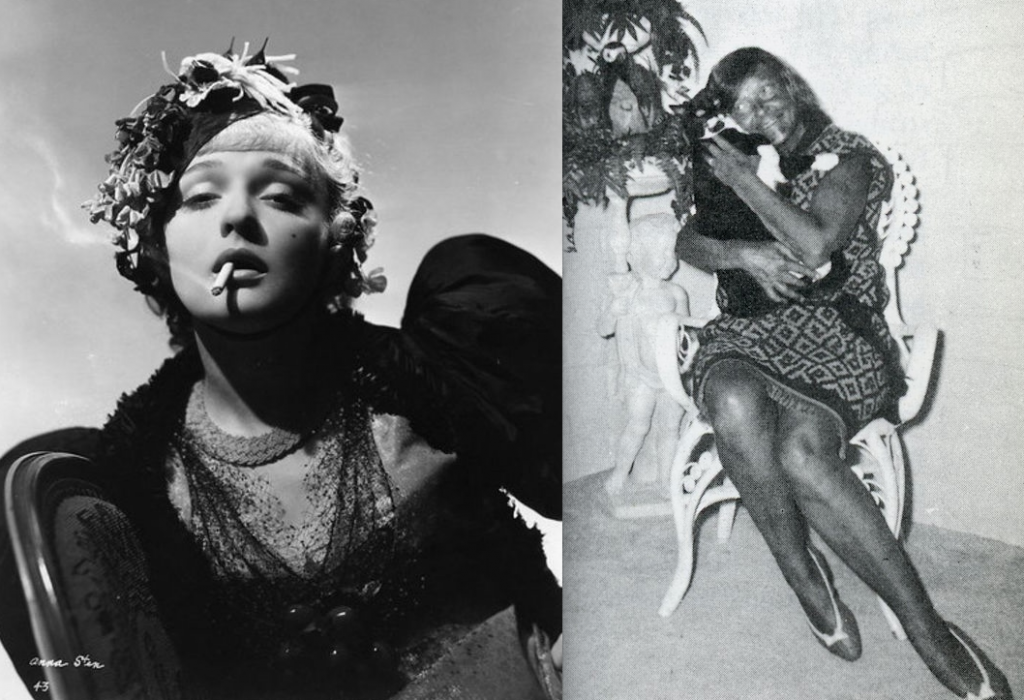
G: Were you ever shocked by a subject’s appearance? I was so disturbed by a deeply tanned Anna Sten.
RL: The big question before the door opened after I rang the bell, then it would open, and I would think, “Now, is this her daughter, or is this her mother?” Because they either looked ghastly or they looked wonderful! It was either one or the other, and it was the same with the men. I was just very open; it was my nature, I think. Whatever they were, as long as they were seeing me, that’s all I cared about.
G: Did you always choose your own photos to accompany interviews or did you sometimes get images from the stars?
RL: I usually selected them myself because, as any producer will tell you, actors are very poor jduges of what they should be doing. I chose what I thought was the definitive photo, because there usually is one, one that you’d say, “Oh, yeah, that’s Corinne Calvet [1925-2001], that’s exactly how I remember her!” So they usually came from me. Now and then, there was one where they might have a super still that they wanted me to use and I agreed to do it.
G: Did you ever shoot the photos yourself, or did you always have a photographer?
RL: Sometimes I took the photos. In the last three books, they were mostly by a fellow named Marty Jackson, who is now deceased — one of the reasons I didn’t do a twelfth book. He was wonderful because we didn’t work together usually. Also, I was tired of it. Most the people I had wanted to do I had done, and they were asking me about television people I didn’t even know who they were because in those days I didn’t watch very much television.
G: I remember reading that your original photographer was put out of some subjects’ homes because he was black … ?
RL: Yeah, that happened twice. That was Ken Maynard [1895-1973]. He said, “He can not come in.” The other, she said the same thing to me, was Maria Rasputin [1898-1977].
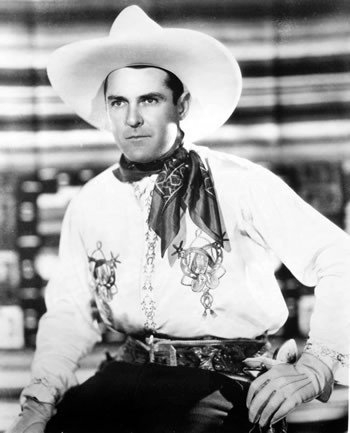
Ken Maynard was a hopeless drunk. Michael was [the photographer’s] name, Michael Knowles, and I told him when we started, “Now, this is gonna happen at some point and just roll with the punch because there’s nothing I can do about it,” and he said yes, he knew that.
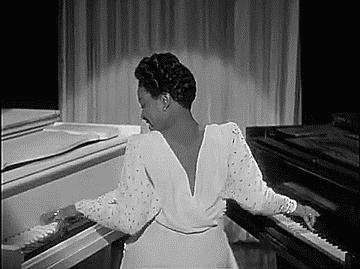
Then we went to interview Hazel Scott [1920-1981] together. I was still doing the radio program and she opened the door and — instant loathing of me, instant; it was visceral. But she took to him. I thought, “I don’t care, as long as she answers my questions,” but she was very rude, very rude. I did the interview with the tape recorder and she answered all of my questions, but she never looked at me, she answered them to him as though he’d asked them and he hadn’t — he was just sitting there, he didn’t participate.
But I didn’t really care. In my mind, all of these instances were very much like sex — if I got the sex and it was good sex, I didn’t care where they lived or how dumb they were. That’s how I felt.
Then when we got done, she said something extremely rude, right before she closed the door. She looked at me and said, “You know, with people, my nose knows.” I was dumbfounded that anyone would say something like that to somebody else. and I said to [Michael] when we got in the elevator, “Did I offend her in some way?” and he said no and I said, “What was the reason?” and he said, ‘She hates white people, simple.” I said, “I can’t help being white. “
It was the beginning of the end for him and me, and I’ll tell you why — because he just loved it, the fact she was so rude to me. By the time the elevator got to the ground floor, I said to him, “You enjoyed that!” and he wouldn’t look at me but he kind of smiled. And I said, “You liked seeing me insulted like that!” And I never thought of him the same since.
G: But you’d felt bad when Maynard and Rasputin had mistreated him?
RL: Oh, I felt awful about it. It happened and you can’t take that away, can’t erase it … and they did it, I didn’t.
G: When I was young, there were lots of elderly silent-film stars around. Now, only a dozen or so [the number is five as of July 2020] human beings are left alive who are known to have set foot in a silent movie —
RL: There are only three “stars” left: Baby Peggy [1918-2020] and Dickie Moore [1925-2015] and Mickey Rooney [1920-2014]. [Update: All three have died.]
G: You interviewed probably hundreds of silent stars. Were they different in some material way from the stars who came later?
RL: They were a different generation. They were born in the nineteenth century. I think maybe because my grandmother was a great influence on me — I lived over her in Detroit, she owned the house, it was a two-family flat, and my mother and father and I lived upstairs and she lived downstairs. I spent a lot of time with her and with her friends and so the way they spoke was not foreign to me. you know, how young people today, if you talk to teenagers, you’re like speaking another language to them. And it wasn’t true with me. I understood the expressions they used and the words they chose so it was much easier for me to interview them than it was for most people.
G: You spoke grandma!
RL: Yes! I understood their attitudes. When I was 22, I went to New York for the summer. I was working for Ice Capades as the press agent and someone introduced me to Aileen Pringle [1895-1989], a silent movie star, and we clicked but immediately, and in those days 58-year-old movie stars did not date 22-year-old guys. I mean, not that we were having an affair, but we did, we went out together like a couple. We were close buddies. And yet looking back on it, it was such a strange relationship! And it want on for a number of years. And through her, I learned the speech of the silent screen, what they liked, what they thought.
I don’t know why people go on about what a wild time it was — it couldn’t have been! They were all very Republican. I can only think of one who wasn’t, Madge Bellamy [1899-1990]. the rest were all bedrock Republican — Gloria Swanson [1899-1993], Mary Pickford [1892-1979], all of ‘em Hearstian.
G: Did you ever interview anyone who died right afterward?
RL: Yes. One was that guy from Disney, that big “Mooseketeer” — I can't think of his real name, but he was a big, fat guy who pretended he was a kid on the Mouseketeer show. [Roy Williams, (1907-1976)] He died days afterward.
G: What about Ramon Novarro, from your first book?
RL: I didn’t interview him.
G: You were probably the first person to interview some of your subjects in decades.
RL: Oh, many of them. The biggest problem when I started was even when I found them and got their phone number and engaged them on the phone, they thought it was a put-on and they weren’t receptive at all and they thought that I was making fun of them. I had a terrible time talking Buster Crabbe [1908-1983] into coming on the program. He said, “What would we talk about? I’m a stockbroker!” I said, “Well, we’ll talk about the movies you made,” and he said, “I haven’t made a movie in — you know how many years it’s been since I’ve been on a movie set? Who would be interested in Flash Gordon [1936-1940]?” I said, “…everyone!” [Laughs]
G: Didn’t TV shows and the like also think your book was a prank when you first published it?
RL: Yeah, they did. They thought it was a joke.
G: Looking back, you might’ve invented the nostalgia industry. Ever attend an autograph show?
RL: No.
G: They put dozens of stars at tables and the stars sell photo ops and autographs. It strikes me as a sort of 3-D version of your books in some ways.
RL: Well, I know people who go to those things and I’ve never been, but they tell me about them and the consensus is the people who come, it’s almost mockery, they’re not really interested in those people, they collect autographs, and they like to see them and say the’ve met them, and a lot of them are very cheeky and one woman was put out twice becasue of the way she spoke to some of the people.
G: I go to them, but I see them differently. I feel like many attendees have zero self-awareness and are doing anything but mocking the stars. If anything, it’s reverence to a scary degree. But there are definitely some loud-mouths who wander up and blurt out, “Gee, you look different!”
RL: It’s done. I know! Years ago, I was at — Bob Chatterton had a thing called The Parlor Cinema when it was almost impossible to see old films, and he showed them in his home and someone came in and did that to Tom Drake [1918-1982]. It was ghastly. They walked in and they looked at him and said, “You are Tom Drake? You can’t be. Tom — ? That she sang ‘The Boy Next Door’ about? Well, what happened to you? I never would’ve recognzied you!” and they put him out. But the damage was done.
G: You must know any once-famous name anyone could ever drop…?
RL: This happened to me recenlty. I tend to dream a great deal and I always thought this was very strange: it’s very seldom that anyone in my dreams are people I know, and they’re people I’m not even interested in. Like General MacArthur [1880-1964] was in a dream with me — I have no interest in him.
About a year ago, I had a very vivid dream that I’d driven into the parking area of a tourist cabin. It was very dark but there was a group of autograph freaks, kids you see hanging around in front of Sardi’s, and I recognized them and I got out of my car and walked over and I said, “What are you doing here?” It was so dark and late! And they said, “Well, we’re waiting for her. She’s very rare. She’ll be here any moment.” And I said, “Who???” and they told me and it was someone I’d never heard of.
With that, a car pulled in front of the highway and parked and the door opened and out stepped this woman who was obviously a movie star, even in the dark of night. Even though I’d never seen her before, she and I immediately had eye contact and as she signed these autographs, she said, “Tomorrow, you come three o’clock and we make the interview, yes?” I said, “I’ll see you tomorrow.”
I had to pee, as one does at four or five o’clock in the morning, but I wrote down her name on the pad I keep on the desk by my bed. I probably wouldn’t have remembered it, but when I woke up the next morning there it was, and I thought “That was a dream! Who the hell is this Miroslava [Miroslava Sternova, 1925-1955]?” It’s hard to stump me with obscure stars.
I called the library and I said, “See what you have,” and he called me back and said, “I have a couple of pages.” I went in and she was born in Czechoslovakia, adopted by a Jewish couple who took her to Mexico when Hitler came to power, and she was raised in Mexico and made a lot of Mexican films.
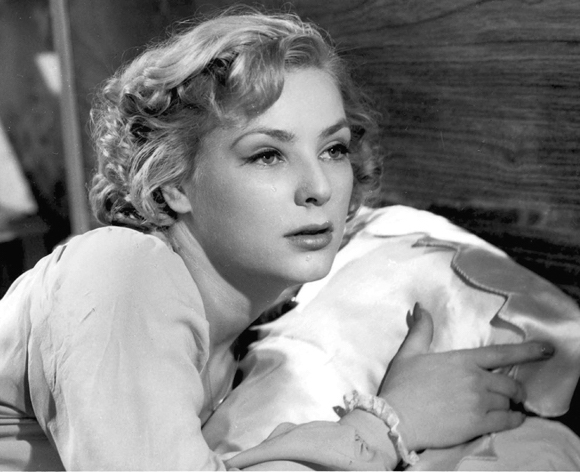
They brought her to Paramount and she made a film about bullfighting [The Brave Bulls, 1951] with Anthony Quinn [1915-2001] in 1950 or '52. She was on the cover of Life. A couple of years later, she committed suicide. [Days after her sportsman lover, Jorge Pasquel, had died in a plane crash.]
How did she get into my dream? I had no idea, even after I heard the name, what she looked like Miroslava … that’s truly reaching out from the grave. I told it to someone and they said, “It’s even a better story that you tell it: If I were Miroslava and I wanted people to remember me, who better but you?”
G: I noticed very few instances of editorializing in your books. I do recall you pointing out that Hedy Lamarr had attended an event at a local drugstore.
RL: I wanted people to know how she lived. I didn’t feel it was a put-down or mean it as one. I was always very careful. The few times I went against my own rule, I was sorry. I tried to keep in mind that however ridiculous some of these people are to me, or to you, someone liked them or they wouldn’t have been there and you’re offending someone if they’re alive — you’re hurting their feelings. I didn’t feel that was my duty. And anyway … they were nice to meet.
G: I’ve seen some of your original correspondence, including a note in which a silent star tells you she’s declining to participate because “it’s the ‘now’ photo that I can do without.” Did you ever miss out on someone really great for reasons of vanity?
RL: Oh, yeah … but there’s so few of them and I got so many people I didn’t think I’d ever regret any. They don’t really reigster as they would with a lot of people. They weren’t rejections, they just decided that they didn’t wanna do it. It was usually one of two reasons: They had very poor health, which was certainly very understandable, or their husband or wife had very poor health. Or they married a rich man who made them promise their carer was over dead and finished and never wanted to speak of it again. That happened a lot. And so I would watch the obituaries, and as soon as I saw he’d died, I’d call and it was, “Fine, come on by!” [Laughs] The widow bloomed!
G: Did you ever track down Barbara Kent [1907-2011]?
RL: No, I couldn’t find her. I don’t think I’ve ever found anyone hiding; they may have said no, but they weren’t hiding, they weren’t pretending not to be — the only one who pretended not to be who he was was from The Bowery Boys, I can’t think of his name, the Jewish boy who always held back, he didn’t want to get into any trouble [Bernard Punsly, 1923-2004]. Anyway, he became a doctor and then he became the head of the hospital. He always said, “That’s my name, but I’m not that person.” We knew it was he.
G: You’ve shed light on the personal lives of so many famous people, what can you tell me about your own life? You, to me, are someone I’ve always wondered about in the same way you may have with Somerset Maugham.
RL: Oh, I see. Well, I can tell you a couple things that will inform you. I haven’t seen another human being in about 14 years. Well, I mean, I see them on the street and people in my building that I say hello to, people in shops, but I haven’t had a social contact in that long, no.
G: But you seem so gregarious on the phone! So fun to talk to.
RL: Yeah, I am, but there’s no effort to talking to someone on the phone. If you were in town and called and said, “Come down, I’ll take you to lunch,” I wouldn’t be bothered to take a shower and put on clean clothes.” [Laughs] There’s nothing wrong with me, I’m not ill.
G: Are you sure you don’t have a rich husband who forbids you to bask in your career?
RL: [Laughs] No, no, nothing like that. I can tell you kind of how it started. I was on a radio program in San Francisco and I was with someone I’d been on with many times; he hosted this radio program. There were only a few minutes left and he said, “Tell me — do you enjoy doing what you do as much as you appear to?” and I said, “I enjoy it far more than I could express,” and he said, “Really?” and I said, “Yes, really.” He said, “Well, with that in mind, what is the downside of being Richard Lamparski?”
Well, the question stunned me. I’d never thought of it! He said, “Well, don’t you agree with me there must be a downside?” I said, “I’m sure, yes, you’re right. There’s a flip side — I wouldn’t say downside — to everything. I’ll think on that. That question deserves an answer.” So I did, I gave it a lot of thought and the answer was my career had made almost everything else in my life quite boring and I had become very sharp with people and a number of people told me and I said, “Well, I’m sorry, it’s the way I feel.”
Someone was telling me about the trouble he was having with his car and he went on and on and on about it and I said to him, “Excuse me, what makes you think I would be the least bit interested in that?”and he said, “Who the hell are you talking to?” and I said, “To you. I spent the morning with Greta Nissen [1906-1988], the one who was replaced by Jean Harlow [1911-1937] in Hell’s Angels [1930] and you’re telling me about your fuckin’ car?” He said, “You’re impolite!” and I said, “No, you’re impolite! I will not have that kind of talk. You want me to tell you about my laundry?”
G: That kind of talk is even more prevalent today with the advent of Facebook.
RL: That’s what we call in radio “dead air.” But I was wrong. But I realized I didn’t need any companionship. I like talking to people on the phone and I have penpals all over, but I don’t really need to socialize with anyone.
G: Speaking of human interaction, did any of your subjects ever hit on you?
RL: Yeah … fewer than I thought would [laughs] because I thought of myself as good-looking. Two women and one man.
G: Oh, gee … Gloria Swanson … ?
RL: No, she did not hit on me. I think she would have been receptive … in fact, I know she would have — we were with two women. [Laughs]
You wanna know who they were? Oh, they’re dead so I guess I can tell: Mae Clarke [1910-1992]…
G: Wow!
RL: … Corinne Calvet … and Ray Stricklyn [1928-2002]. He was a doll, by the way. I liked him — but not like that. He reached over and put his hand on my knee. He was talking, he was making a gesture, but at the same time he was making a pass, and I just ignored it. But what I wanted to say was, ‘Why didn’t you do this about 30 years ago?” [Laughs] When he was young, he was a doll, but you can’t say that.
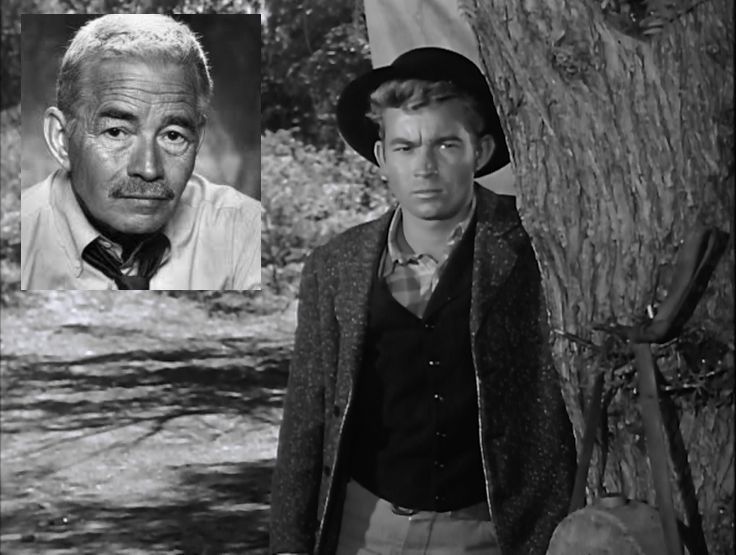
G: I'm surprised more men didn't come after you.
RL: Oh, there was another one, but he’s still living and he considers himself to be straight, so I don’t want to embarrass him.
He did a somersault and he hung from a bar in his bedroom, and anyway half of his bare ass was hanging out. Then he got down, he looked at me and he said, “People are very narrow-minded, don’t you find?” and I said, “Some people are…” and he said, “You know, some people think homosexuality is wrong…”
I think the phone rang. and I was relieved. Again, I would’ve said to him, ‘Twenty years ago you would’ve had some action very quick.” The funny part of it is I knew him when he was young. We’re exactly the same age; his birthay is this coming week [interview conducted October 4, 2012] and I knew him when he was a star and he was a doll.
He said to me years later, “I remember you from the Beverly Hills Health Club. You were always in the steam room.” I knew his wife was on the phone downstairs and I said, “You know, you were tied with Herb Alpert [b. 1935] as the cutest guy there,” and he said, “Really?” and I said, “Yes, you and Herb Alpert.” Herb Alpert was very pretty when he was young. He said, “I didn’t know we were the most popular.” I said, “No, the most popular of all was an actor named James Olson [b. 1930].” He said, “Oh, I remember him; he was at Warner’s. Why was he the most popular?” And I said, “Why don’t you guess?”
I heard his wife laughing on the other end. I love embarrassing straight men. There’s nothing I enjoy more. Today, they can’t do anything about it. They can’t pretend they don’t understand! They used to pretend they didn’t understand … they understand now!
Richard Lamparski is also the author of the books Hollywood Diary and Manhattan Diary.






My neighbor is a friend of author Boze Hadleigh, who has spoken highly of Matthew Rettenmund, and I happened on this interview by Mr. R. with R. Lamparski. I saw a book by Matthew in my friend’s library and he said Mr. H. had given it to him. On his coffee table my neighbor has a copy of a 2020 book of BH titled “Inside the Hollywood Closet” and I looked inside it and didn’t put it down until I was told dinner was ready (there were just four of us). Fascinating book! Anyway, hello to Matthew, and I’ll soon get my own copy of ItheHC. Now that everyone’s staying-in-place, reading is the thing….
Ha, loved the Hazel Scott story. Imagine telling a black person, “Look, people are going to treat you like shit, get over it” and then getting upset when the one time in your life a black person doesn’t treat you well. I guess, as a white person, he was not required to get over it.
Yeah, he is a very interesting individual, but not exactly forward-thinking, which sort of fits. I wondered about his reporting, and what might have led to Hazel Scott reacting to him that way. Context, etc., as I doubt she was automatically mean or dismissive to every white person she met.
[…] legendary. While the existence of the interview was known, a copy of it was not. The interview was conducted by Richard Lamparski and broadcast on WBAI, a non-commercial station in New York. Lamparski—who is still very much […]
[…] to listen to this hourlong interview from 1966 with the legendary Dorothy Parker, as conducted by Richard Lamparski. Until today, this recording was unknown, and it is the longest sit-down with Parker in […]
I hope to read his whole series some day.
This was fun! I poured over his books as a kid, loved bringing another long lost name to my mother for her to say, Of course I remember so and so!
I have one of his ancient hardcovers I found at an estate sale 10,000 years ago AND it’s signed by him!
If memory serves, he may have written it in cursive, all lower case, very e.e. cummings.
I suppose he invented a version of Wikipedia before any of this was even thought about.
Thanks!
Thanks! I really appreciate that you read this and offered such fun feedback. I have most of his books. He’s … a character.
I wish someone could bring this book series back! There are so many lost, forgotten, retried performers from the 70s/80s/90s that have disappeared off the face of the earth.